- Home
- Wendell Berry
New Collected Poems Page 13
New Collected Poems Read online
Page 13
his clear song: Even
so. Even so.
Divided by little songs
these silences keep folding
back upon themselves
like long cloths put away.
They are all of the one
silence that precedes
and follows us. Too much
has fallen silent here.
There are names that rest
as silent on their stone
as fossils in creek ledges.
There are those who sleep
in graves no one remembers;
there is no language here,
now, to speak their names.
Too much of our history
will seem to have taken place
in the halls of capitals,
where the accusers have
mostly been guilty, and so
have borne witness to nothing.
Whole lives of work are buried
under leaves of thickets,
hands fallen from helves.
What was memory is dust
now, and many a story
told in shade or by the fire
is gone with the old light.
On the courthouse shelves
the facts lie mute
upon their pages, useless
nearly as the old boundary
marks—“Beginning on
the bank of the Kentucky River
at the mouth of Cane Run
at a hackberry” (1865) —
lost in the silence of
old days and voices. And yet
the land and the mind
bear the marks of a history
that they do not record.
The mind still hungers
for its earth, its bounded
and open space, the term
of its final assent. It keeps
the vision of an independent
modest abundance. It dreams
of cellar and pantry filled,
the source well husbanded.
And yet it learns care
reluctantly, and late.
It suffers plaintively from
its obligations. Long
attention to detail
is a cross it bears only
by congratulating itself.
It would like to hurry up
and get more than it needs
of several pleasant things.
It dreads all the labors
of common decency.
It recalls, with disquieting
sympathy, the motto
of a locally renowned
and long dead kinsman: “Never
set up when you can lay down.”
The land bears the scars
of minds whose history
was imprinted by no example
of a forebearing mind, corrected,
beloved. A mind cast loose
in whim and greed makes
nature its mirror, and the garden
falls with the man. Great trees
once crowded this bottomland,
so thick that when they were felled
a boy could walk a mile
along their trunks and never
set foot to ground. Where
that forest stood, the fields
grew fine crops of hay:
men tied the timothy heads
together across their horses’
withers; the mountains upstream
were wooded then, and the river
in flood renewed its fields
like the Nile. Given
a live, husbandly tradition,
that abundance might
have lasted. It did not.
One lifetime of our history
ruined it. The slopes
of the watershed were stripped
of trees. The black topsoil
washed away in the tracks
of logger and plowman.
The creeks, that once ran clear
after the heaviest rains,
ran muddy, dried in summer.
From year to year watching
from his porch, my grandfather
saw a barn roof slowly
come into sight above
a neighboring ridge as plows
and rains wore down the hill.
This little has been remembered.
For the rest, one must go
and ponder in the silence
of documents, or decipher
on the land itself the healed
gullies and the unhealed,
the careless furrows drawn
over slopes too steep to plow
where the scrub growth
stands in vision’s failure now.
Such a mind is as much
a predicament as such
a place. And yet a knowledge
is here that tenses the throat
as for song: the inheritance
of the ones, alive or once
alive, who stand behind
the ones I have imagined,
who took into their minds
the troubles of this place,
blights of love and race,
but saw a good fate here
and willingly paid its cost,
kept it the best they could,
thought of its good,
and mourned the good they lost.
THE CLEARING
For Hayden Carruth
1.
Through elm, buckeye, thorn,
box elder, redbud, whitehaw,
locust thicket, all trees
that follow man’s neglect,
through snarls and veils
of honeysuckle, tangles
of grape and bittersweet,
sing, steel, the hard song
of vision cutting in.
2.
Vision must have severity
at its edge:
against neglect,
bushes grown over the pastures,
vines riding down
the fences, the cistern broken;
against the false vision
of the farm dismembered,
sold in pieces on the condition
of the buyer’s ignorance,
a disorderly town
of “houses in the country”
inhabited by strangers;
against indifference, the tracks
of the bulldozer running
to gullies;
against weariness,
the dread of too much to do,
the wish to make desire
easy, the thought of rest.
3.
“We don’t bother nobody,
and we don’t want nobody
to bother us,” the old woman
declared fiercely
over the fence. She stood
in strange paradise:
a shack built in the blast
of sun on the riverbank,
a place under the threat of flood,
bought ignorantly, not
to be bothered. And that
is what has come of it,
“the frontier spirit,” lost
in the cities, returning now
to be lost in the country,
obscure desire floating
like a cloud upon vision:
to be free of labor,
the predicament of other lives,
not to be bothered.
4.
Vision reaches the ground
under sumac and thorn,
under the honeysuckle,
and begins its rise.
It sees clear pasture,
clover and grass, on the worn
hillside going back
to woods, good cropland
in the bottom gone to weeds.
Through time, labor, the fret
of effort, it sees
cattle on the green slope
adrift in the daily current
of hunger. And
vision
moderates the saw blade,
the intelligence
and mercy of that power.
Against nature, nature
will serve well enough
a man who does not ask too much.
We leave the walnut trees,
graces of the ground
flourishing in the air.
5.
A man who does not ask too much
becomes the promise of his land.
His marriage married
to his place, he waits
and does not stray. He takes thought
for the return of the dead
to the ground that they may come
to their last avail,
for the rain
that it stay long in reach of roots,
for roots
that they bind the living
to the dead, for sleep
that it bring breath through the dark,
for love in whose keeping
bloom comes to light.
Singularity made him great
in his sight.
This union makes him small,
a part of what he would keep.
6.
As the vision of labor grows
grows the vision of rest.
Weariness is work’s shadow.
Labor is no preparation
but takes life as it goes
and casts upon it
death’s shadow, which
enough weariness may welcome.
The body’s death rises
over its daily labor,
a tree to rest beneath.
But work clarifies
the vision of rest. In rest
the vision of rest is lost.
The farm is the proper destiny,
here now and to come.
Leave the body to die
in its time, in the final dignity
that knows no loss in the fallen
high horse of the bones.
7.
In the predicament of other lives
we become mothers of calves,
teaching them, against nature,
to suck a bucket’s valved nipple,
caring for them like life
itself to make them complete
animals, independent
of the tit. Fidelity
reaches through the night
to the triumph of their lives,
bawling in the cold barn before
daylight—to become, eaten,
the triumph of other lives
perhaps not worthy of them,
eaters who will recognize
only their own lives
in their daily meat.
But no matter. Life
must be served. Wake up,
leave the bed, dress
in the cold room, go under
stars to the barn, come
to the greetings of hunger,
the breath a pale awning
in the dark. Feed
the lives that feed
lives.
When one sickens
do not let him die. Hold out
against the simple flesh
that would let its life go
in the cold night. While he lives
a thought belongs to him
that will not rest. And then
accept the relief of death.
Drag the heedless carcass
out of the stall, fling it
in the bushes, let it
lie. Hunger will find it,
the bones divide by stealth,
the black head with its star
drift into the hill.
8.
Street, guns, machines,
quicker fortunes, quicker deaths
bear down on these
hills whose winter trees
keep like memories
the nests of birds. The arrival
may be complete in my time,
and I will see the end
of names. The history
of lives will end then,
the building and wearing away
of earth and flesh will end,
and the history of numbers
will begin. Then why clear
yet again an old farm
scarred by the lack of sight
that scars our souls?
The struggle is on, no
mistake, and I take
the side of life’s history
against the coming of numbers.
Make clear what was overgrown.
Cut the brush, drag it
through sumac and briars, pile it,
clear the old fence rows,
the trash dump, stop
the washes, mend the galls,
fence and sow the fields,
bring cattle back to graze
the slopes, bring crops back
to the bottomland. Here
where the time of rain is kept
take what is half ruined
and make it clear, put it
back in mind.
9.
February. A cloudy day
foretelling spring by its warmth
though snow will follow.
You are at work in the worn field
returning now to thought.
The sorrel mare eager
to the burden, you are dragging
cut brush to the pile,
moving in ancestral motions
of axe-stroke, bending
to log chain and trace, speaking
immemorial bidding and praise
to the mare’s fine ears.
And you pause to rest
in the quiet day while the mare’s
sweated flanks steam.
You stand in a clearing whose cost
you know in tendon and bone.
A kingfisher utters
his harsh cry, rising
from the leafless river.
Again, again, the old
is newly come.
10.
We pile the brush high,
a pyre of cut trees,
not to burn as the way
once was, but to rot and cover
an old scar of the ground.
The dead elm, its stump
and great trunk too heavy to move,
we give to the riddance of fire.
Two days, two nights
it burns, white ash falling
from it light as snow.
It goes into the air.
What bore the wind
the wind will bear.
11.
An evening comes
when we finish work and go,
stumblers under the folding sky,
the field clear behind us.
WORK SONG
I. A Lineage
By the fall of years I learn how it has been
With Jack Beechum, Mat Feltner, Elton Penn,
And their kind, men made for their fields.
I see them stand their ground, bear their yields,
Swaying in all weathers in their long rows,
In the dance that fleshes desire and then goes
Down with the light. They have gone as they came,
And they go. They go by a kind of will. They claim
In the brevity of their strength an ancient joy.
“Make me know it! Hand it to me, boy!”
2. A Vision
If we will have the wisdom to survive,
to stand like slow-growing trees
on a ruined place, renewing, enriching it,
if we will make our seasons welcome here,
asking not too much of earth or heaven,
then a long time after we are dead
the lives our lives prepare will live
here, their houses strongly placed
upon the valley sides, fields and gardens
rich in the windows. The river will run
clear, as we wi
ll never know it,
and over it, birdsong like a canopy.
On the levels of the hills will be
green meadows, stock bells in noon shade.
On the steeps where greed and ignorance cut down
the old forest, an old forest will stand,
its rich leaf-fall drifting on its roots.
The veins of forgotten springs will have opened.
Families will be singing in the fields.
In their voices they will hear a music
risen out of the ground. They will take
nothing from the ground they will not return,
whatever the grief at parting. Memory,
native to this valley, will spread over it
like a grove, and memory will grow
into legend, legend into song, song
into sacrament. The abundance of this place,
the songs of its people and its birds,
will be health and wisdom and indwelling
light. This is no paradisal dream.
Its hardship is its possibility.
3. A Beginning
October’s completing light falls
on the unfinished patterns of my year.
The sun is yellow in a smudge
of public lies we no longer try
to believe. Speech finally drives us
to silence. Power has weakened us.
Comfort wakens us in fear. We are
a people who must decline or perish.
I have let my mind at last bend down
where human vision begins its rise
in the dark of seeds, wombs of beasts.
It has carried my hands to roots
and foundings, to the mute urging
that in human care clears the field
and turns it green. It reaches
the silence at the tongue’s root
in which speech begins. In early mist
I walk in these reopening fields
as in a forefather’s dream. In dream
and sweat the fields have seasoning.
Let my words then begin in labor.
Let me sing a work song
and an earth song. Let the song of light
fall upon me as it may.
The end of this is not in sight.
And I come to the waning of the year
weary, the way long.
FROM THE CREST
1.
What we leave behind to sleep
is ahead of us when we wake.
Cleared, the field must be
kept clear. There are more
clarities to make.
The farm is an infinite form.

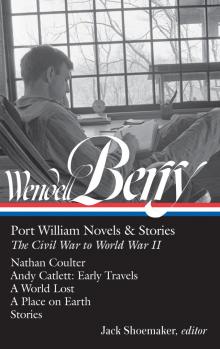 The Selected Poems of Wendell Berry
The Selected Poems of Wendell Berry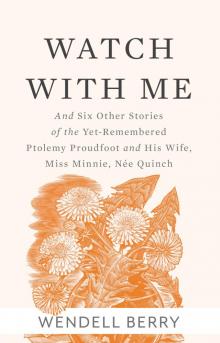 Watch With Me
Watch With Me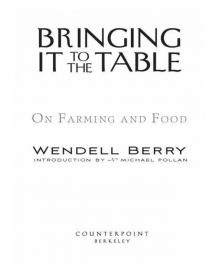 Bringing It to the Table: On Farming and Food
Bringing It to the Table: On Farming and Food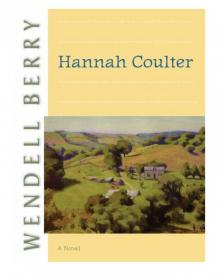 Hannah Coulter
Hannah Coulter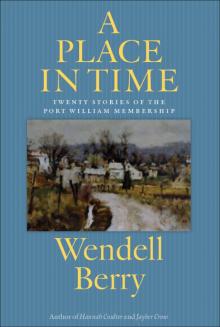 A Place in Time: Twenty Stories of the Port William Membership
A Place in Time: Twenty Stories of the Port William Membership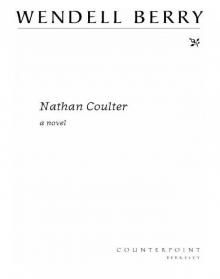 Nathan Coulter
Nathan Coulter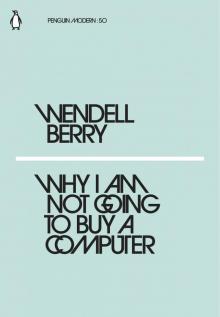 Why I Am Not Going to Buy a Computer
Why I Am Not Going to Buy a Computer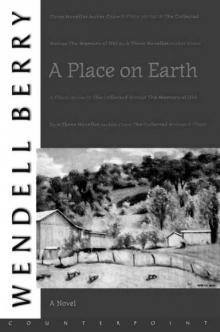 A Place on Earth
A Place on Earth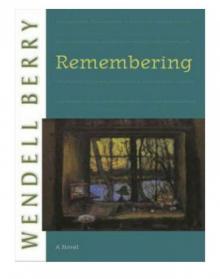 Remembering
Remembering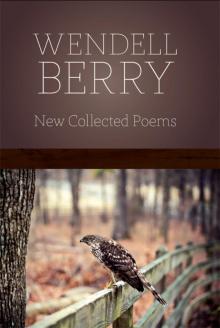 New Collected Poems
New Collected Poems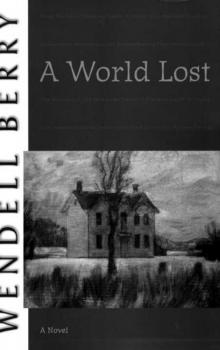 A World Lost
A World Lost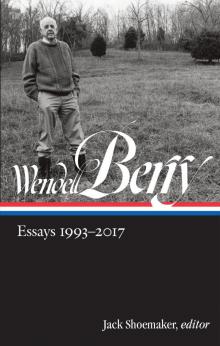 Wendell Berry
Wendell Berry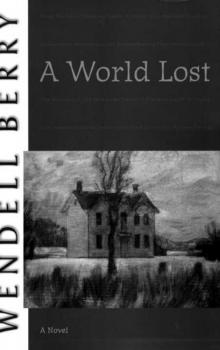 A World Lost: A Novel (Port William)
A World Lost: A Novel (Port William)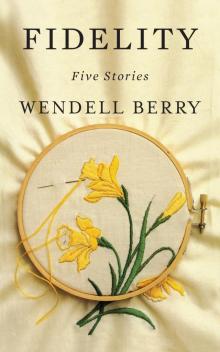 Fidelity
Fidelity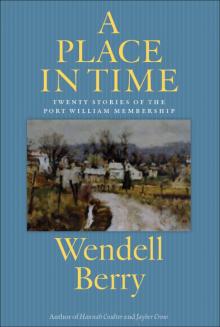 A Place in Time
A Place in Time